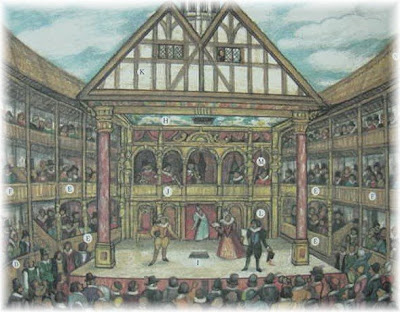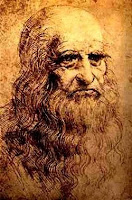
 At an early stage movies, and arts in general, were not, yet, divided into entertainment and pure art. The art for its own sake is a relatively new and in a way conventional concept.
At an early stage movies, and arts in general, were not, yet, divided into entertainment and pure art. The art for its own sake is a relatively new and in a way conventional concept.
I can't imagine Leonardo DaVinci thinking about whether he should entertain or create something of an eternal value. He did what he felt doing in tune with the sensibilities of his time and people.
 Great art is always entertaining but
Great art is always entertaining butentertainment, even great entertainment,
cannot be art. In other words, Chaplin was entertaining and could have had his own late night show just like David Letterman but Letterman cannot be Chaplin.
By the same token, Shakespeare’s plays are entertaining and are great art at the same time.
Yet, numberless other plays at the Globe theatre in the 16th century London were probably even more entertaining to the public but they had never reached the level of mastery as the Shakespeare’s works did.
On the other hand, the entertainers of London theatres could very well do without Shakespeare (as they did before and after) but Shakespeare could not be possible without all the 16century theatrical entertainment.
All the great masters and masterpieces of great art were possible in the environments where the level of mere entertainment was elevated and stimulating.
The stronger the environment the stronger the master for the master and his art is a culmination of his and her surrounding.
Had Leonardo been not born during the cultural upheaval in Italy, were ordinary people’s interest and sensibility in visual arts was heightened and profound, he would have had less chances to flourish to the degree he did.
To understand the relation of art and entertainment it is helpful to clarify their etymology.
The very genesis of the English verb "to entertain" implies continuity for it is derivative from Latin inter 'among' and tenere 'to hold'. Entertain means to maintain, to continue. But what is it that it is supposed to maintain or to continue?
In Shakespeare's time and a little later the verb obtained an additional meaning that of 'maintaining in a certain condition', 'treating in a certain way', and/or 'showing hospitality'.
In "Henry VI", Part i, Shakespeare uses the verb with this new meaning,
"I am sorry, that with reverence I did not entertain thee as thou art".
The variations of meaning of the word point in a direction that implies a certain way of doing things, a way that needs to be preserved, a way 'it ought to be', a way it is worth to continue. This, in turn, implies a reality or a state of mind that needs to be entertained, or continued, or maintained. So one cannot entertain without a knowledge of the assumed reality or the knowledge of its existence. Entertainment is derivative of a reality beyond itself and is pointed to that reality.


It was only in the 18th century when the noun 'entertainment' implied a public performance intended to amuse an audience. Now, the word amusement was not equated to entertainment until the 17th century. Originally meaning 'deception', amuser came from the Old French, from a- expressing a causal effect and muser 'stare stupidly'. The Oxford Dictionary of Word Histories notes: 'Current senses relating to entertainment date from 17th century at the time when the noun amusement (from French) is recorded meaning 'musing, diversion of attention'.
There is a fundamental difference between the concept of entertainment and amusement. The former leads to a reality beyond itself, the latter tricks the observer into believing that it is a self-sustained reality. Entertainment is a key to the unknown; amusement is using that unknown to lock the door and focus attention on itself.
This is the essence of magic tricks where an effort is put to make the audience believe (or muser -'stare stupidly') that the reality of the trick is self-sufficient. The trick does not move you to a reality beyond itself, it is not incentive to understanding the process that makes it possible because the process is that of a deception and delusion. It is literally, a 'diversion of attention" from a reality of its own process.
Amusement has elements of entertainment but unlike entertainment it does not lead to a higher form of expression, art. Entertainment depends on the elements of amusement, yet, by definition has to overcome them, or elevate them to next step.
Art depends on the entertainment.
This is why strong and solid entertainment is a sign of great art on the horizon.
This is why good entertainment is important. A cultural establishment cannot create an artist but it can create a solid foundation for an artist to build upon.
What happens today, in the movies and elsewhere, is a very perverted process. Solid entertainment is replaced by a strange extroverted showcase so unrealistically labeled as a reality show, barely acceptable entertainment is marketed as great art and great art is made impossible. In other words, amusement is considered entertainment, entertainment is elevated to the status of art and art is deemed unnecessary.
The quality of entertainment and its style feeds from the wholeness of cultural, political, economic and national factors and experiences. In our confused and relativist times when ambiguity of thought and inability to focus is sold as thoughtfulness, clarity is an archaic fancy. Our culture is a disguised pornography, politics is a partisan warfare, economics is permeated with fear and the idea of people as nation dismissed as fascism. Any attempt to create a clear and simple form of action and communication, whether in politics, economics or culture is met with a disarming 'Baby, it's not John Wayne's time anymore' line.
There are laws of human art are the are laws of Spirit and Nature. These laws are clear and simple, which allows for a complex human construction upon them. Those who do not understand the simplicity of laws create rules to complicate them and confuse complexity with perplexity. Complexity, though, is an elaborate simplicity. A complex, multilayer building is constructed by simple known laws and their variations, not by an ambigiuty and by laws of relaitvity. The constructions of the entertainment-industrial complex today are shaky and dangerous. The day is not far when this irresponsibly built lawless construction buries its occupants under its rubble.
The demand creates reality and we were trained to demand mediocrity. We have been taught to be satisfied with entertainment that does not resonate within us and does not move us in depth. We were indoctrinated to accept light with darkness and got used to living in a good apartment in a bad neighborhood. So, we pointlessly float on the surface in the hope that the good stream will take us to that lonely island not infected, yet, with the deseases of our time.
We comfort ourselves with a hope that artists will be artists anyway and will do their art regardless how low the common denominator is dropped for the culture in general. It is a very comforting thought, a false but comforting thought.

The same people who are responsible for littering the cultural highways wage an environmental war for pure arts. They scout for people who are not entirely in the gutter and proclaim them artists. This is the only reason why such a dull and fake movie as “There Will Be Blood” was proclaimed an American classic and socially concerned but essentially meaningless Paul Thomas Anderson as the new George Orson Wells.
This is why men conflicted about their sexuality are coined as leading male protagonists, hysterical women who overpower those men are elevated to a goddess status and mediocre directors are put in charge of the overall offensive.
The solid entertainment must have a direction. It should be a helpful push, a key to unlocking the door to mysteries of life through the arts. However silly and superficial, entertainment must be an emanation and an imitation of great art, a simpler formalistic expression of a complex source. It should be simplified for the masses in order for them to reconnect with the realities, which will require some extra steps to enter.
Today, the cheap and meaningless entertainment industry dictates our tastes and moods. Current entertainment is not just stupid; it is arrogant for it assumes to be more important than its source. Without a sense of direction and with proud self-gratification, it leads people away from a possibility to know arts and eventually to know themselves.
It also destroys the seeds of artistry in people who need a solid foundation and mileage on their way to mastery.
In its essence, all this silliness and glorification of dumb and dull is evil masquerading as entertainment. It is evil because it takes one away from good and there are no buffer zones or border states between good and evil. This is a reality from which the modern thought defended itself with a shield of relativism. Yet, there is no hiding from the fact that deceptive entertainment is not even an amusement but simply wrong and evil.
As all evil it has no staying power but possesses very strong marketing tools and an ability to undo good and delay great.






No comments:
Post a Comment